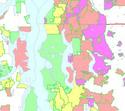We used to call it “Free Agent Nation.” Now, it seems like the new term of art will be “The 1099 Economy.” While the names may change, they all point to a phenomenon of rising importance: the growing number of Americans who don’t have a “regular job” but instead work on individual contracts with employers or customers. These folks don’t get the traditional W-2 paystub at the end of the year; they report their taxes with the IRS form 1099. read more »
Demographics
The Evolving Urban Area: Seattle
Lunching at Seattle's Space Needle, the casual observer might imagine that one of the nation's most dense urban areas is spread out below. To the immediate south of the Space Needle is one of the nation's premier downtown areas. In 2000 downtown Seattle had the seventh largest employment base in the country and was one of the most dense. Its impressive, closely packed buildings witness a storied past. read more »
Will J.R. Recognize the New Dallas?
In the sixties and seventies, Dallas’s prime tourist attraction was an assassination site. The town seriously needed a new image. It got one in a soap opera that revealed a city besieged by blonds, big hair and big homes. “Dallas,” which premiered in 1978, did for Big D what “Sex in the City” and “Seinfeld” did for New York: it painted a portrait of the city for the world. read more »
Outlawing New Houses in California
UCLA's most recent Anderson Forecast indicates that there has been a significant shift in demand in California toward condominiums and apartments. The Anderson Forecast concludes that this will cause problems, such as slower growth in construction employment because building multi-unit dwellings creates less employment than building the detached houses that predominate throughout California and most of the nation. read more »
Enterprising States: Hard choices now, hard work ahead: State Strategies to Renew Growth and Create Jobs
This is an excerpt from "Enterprising States: Creating Jobs, Economic Development, and Prosperity in Challenging Times" authored by Praxis Strategy Group and Joel Kotkin. The entire report is available at the National Chamber Foundation website, including highlights of top performing states and profiles of each state's economic development efforts.
- Login to post comments
Enterprising States: Recovery and Renewal for the 21st Century
This is an excerpt from "Enterprising States: Creating Jobs, Economic Development, and Prosperity in Challenging Times" authored by Praxis Strategy Group and Joel Kotkin. The entire report is available at the National Chamber Foundation website, including highlights of top performing states and profiles of each state's economic development efforts.
Sweden: A Role Model for Capitalist Reform?
Sweden is often held up as a role model for those wishing to expand the size of government in the U.S. and other nations. The nation is seen as combining a large public sector with many attractive features, such as low crime rates, high life expectancy and a high degree of social cohesion.
But in actuality the success of the Swedish society lies not with the extent of its welfare state, but as the result of cultural and demographic factors as well as a favourable business environment throughout most of Sweden's modern history. read more »
Hey, Dad: Family Still Matters!
America is getting older. Those over the age of 65, which currently account for 12% of the population, are expected to make up 20% of the population by 2030. People are marrying later, and a growing group, though still a distinct minority, is choosing not to have children. read more »
- Login to post comments
The Evolving Urban Form: Shanghai
According to the results of the 2010 census, Shanghai's population was nearly 1,000,000 people more than had been projected by local authorities. The provincial level of jurisdiction grew from a population of 16.4 million in 2000 to 23.0 million in 2010. Shanghai is one of the world's fastest growing megacities (urban regions of more than 10 million population). read more »
Will the Last Family Leaving Seattle Please Turn out the Lights?
New Census data for the Seattle area's population changes, 2000-2010, permit a preliminary look at age and at types of households in the region. Let's look at patterns of geographic variation in selected age groups and household types for places in greater Seattle. It provides more evidence for how rapidly Seattle in particular is changing in fundamental ways. read more »





















